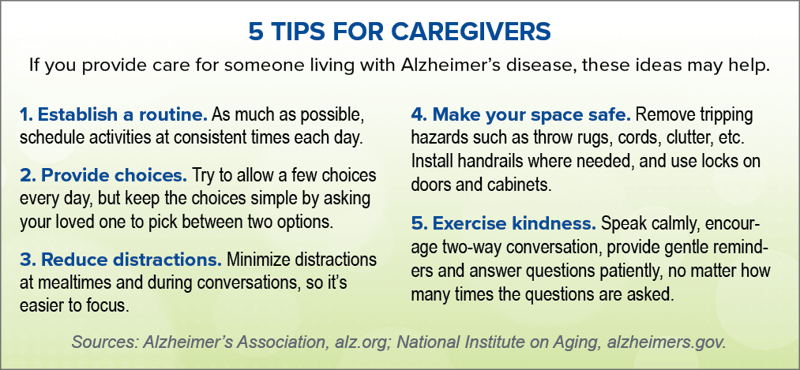Did you know that one in nine people aged 65 and older are living with Alzheimer’s? That’s more than 11% of people in the over-65 age group – and that number is expected to increase substantially over the next 25 to 30 years.[1] Although Alzheimer’s and related dementias are not normal parts of the aging process, they’re becoming increasingly common, so September, which is World Alzheimer’s Month, is a good time to review the signs and symptoms, possible causes and preventions, and the latest research and treatments.
10 Signs and Symptoms
As we age, many of us have occasional difficulty recalling words or remembering what we were doing. So how do you know what’s normal and what’s worrisome? This list, created with help from the Alzheimer’s Association,[2] may help. And if you’re concerned about your health, it never hurts to talk to your doctor. Early detection can make a big difference.
1. Memory loss that affects your day-to-day functions
One of the most common early signs of Alzheimer’s disease is forgetting recently learned information as well as important dates or events, asking the same questions multiple times, and increasingly needing to rely on memory aids, such as reminder notes or electronic devices.
2. Struggling to plan or solve problems
Making and/or following a plan, as well as working with numbers, proves increasingly difficult for those with Alzheimer’s. This can be an inability to follow a familiar recipe or keep track of monthly bills, and even simple tasks can take much longer than they used to.
3. Difficulty completing familiar tasks
When what was routine suddenly becomes difficult, such as a longtime hobby like knitting, this could be a sign of Alzheimer’s, especially if the struggles continue for days or weeks.
4. Confusion with time or place
Everyone loses track of days and dates from time to time, but those affected by this disease often fail to understand the passage of time and may forget where they are or how they got there.
5. Trouble with vision and images
While declining vision is common among aging adults, difficulty with judging distances and colors is associated with Alzheimer’s disease. These issues often make driving difficult.
6. New problems with speaking or writing
Following or participating in conversation can be hard for people with Alzheimer’s. They may use the wrong names for common objects and often struggle to complete thoughts.
7. Misplacing things and being unable to retrace steps
It’s easy to misplace things, but for most people, the process of finding those items usually includes recalling recent activities and looking in likely locations. However, those with Alzheimer’s are often unable to retrace their steps and struggle to find what’s missing.
8. Decreased or poor judgement
Changes in judgment or decision-making can be a symptom of Alzheimer’s. Those with the disease may have difficulty choosing what to eat or what to wear and may seem to make inappropriate choices on these and other issues, such as hygiene and spending.
9. Withdrawal from work or social activities
When activities and conversation become challenging, those with Alzheimer’s often stop participating.
10. Changes in mood and personality
Alzheimer’s is associated with confusion and depression as well as paranoia, anxiety and aggression.
Possible Risk Factors and Preventions
Despite extensive research, it’s still not clear what actually causes Alzheimer’s in most people. What is known is that changes in the brain, including plaques and tangles, prevent information from being processed. Because the cause of these changes is unclear, it’s difficult to pinpoint the risk factors. However, scientists do believe that:[3],[4]
- Age is the most important known risk factor, so as people age, the risk of developing Alzheimer’s increases.
- Those with family history of the disease are more likely to develop it.
- Women make up almost two-thirds of known cases in the U.S.
- Black and Hispanic Americans are more likely than Whites to have Alzheimer’s and other dementias.
- Medical conditions, such as heart disease, stroke, high blood pressure, diabetes and obesity, could be contributing factors as well.
Unfortunately, there is little that can be done about the most common risk factors, so there aren’t any reliable preventive options. However, doctors do suggest that healthy aging may lower risk. This includes:[5]
![]() Following a nutritious eating plan
Following a nutritious eating plan
![]() Staying physically active
Staying physically active
![]()
Maintaining social relationships
![]() Getting plenty of sleep
Getting plenty of sleep
![]()
Pursuing mentally stimulating activities
The Latest Research and Treatments
Unfortunately, there is currently no cure for this disease. There are several medications that can provide some temporary help with some of the symptoms, such as memory loss and confusion, but these medications don’t stop the disease from progressing.
Recently, the FDA approved Aduhelm, the first medication intended to affect disease progression. However, questions about the drug’s effectiveness and price mean that some insurers aren’t providing coverage, and many healthcare providers are not administering it. The FDA is requiring more studies and data from the drugmakers, but it could be at least 9 years before this information is available.[6] Elixir's committee that considers coverage for new drugs has determined that there isn't enough evidence about its effectiveness to justify covering Aduhelm at this time, but we’ll continue to review as additional information becomes available.
Other drug makers are working on similar products, so there may one day be a medication that can stop this disease in its tracks. In the meantime, talk to you doctor if you have concerns, and make every effort to maintain your best health; connect with friends and family on the phone, Internet or in person if possible; regularly get a good night’s sleep; and keep your brain active with games, puzzles and other pursuits.

[1] Alzheimer’s Association (2021). 2021 Alzheimer’s Disease Facts and Figures. https://www.alz.org/news/2021/new-alzheimers-association-report-examines-racial
[2] Alzheimer’s Association (2021). 10 Early Signs and Symptoms of Alzheimer’s https://www.alz.org/alzheimers-dementia/10_signs
[3] National Institute on Aging (2019). What Causes Alzheimer's Disease? https://www.nia.nih.gov/health/what-causes-alzheimers-disease
[4] Alzheimer’s Association (2021). 2021 Alzheimer’s Disease Facts and Figures. https://www.alz.org/news/2021/new-alzheimers-association-report-examines-racial
[5] National Institute on Aging (2019). What Causes Alzheimer's Disease? https://www.nia.nih.gov/health/what-causes-alzheimers-disease
[6] Kaiser Health News (2021). Doctors Weigh Pros and Cons of Prescribing Hot-button Alzheimer’s Drug. https://khn.org/news/article/doctors-weigh-pros-and-cons-of-prescribing-hot-button-alzheimers-drug/
S7694_21-6590_enewsletter 2021_C Reviewed 09/16/21
Elixir Insurance is a Prescription Drug Plan with a Medicare contract. Enrollment in Elixir Insurance depends on contract renewal. For more information, please call our customer service number at 866-250-2005. TTY users call 711. We are available 24 hours a day, 7 days a week. ATTENTION: If you speak Spanish, language assistance services, free of charge, are available to you. Call 866-250-2005 (TTY: 711). ATENCIÓN: si habla Español, los servicios de asistencia lingüística, sin cargo, están disponibles para usted. Llamada 866-250-2005 (TTY: 711).
Elixir Insurance, 2181 East Aurora Road, Suite 201, Twinsburg, OH 44087, United States


